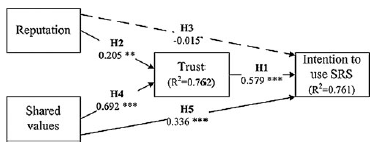Trust, Shared Values, Reputation of Online Reviewers Influence Purchase Decisions
![]() In a recent issue of Cyberpsychology, Behavior, and Social Networking, Chang and Hsiao1 tried to determine why people do or do not follow recommendations provided by social recommendation systems – think of reviews on Amazon.com. Researchers have already identified that, in general, people do pay attention to such recommendations. But what is left unanswered is why some people don’t.
In a recent issue of Cyberpsychology, Behavior, and Social Networking, Chang and Hsiao1 tried to determine why people do or do not follow recommendations provided by social recommendation systems – think of reviews on Amazon.com. Researchers have already identified that, in general, people do pay attention to such recommendations. But what is left unanswered is why some people don’t.
The researchers decided that social exchange theory provided a valuable framework for investigating this issue. According to social exchange theory, people share information about themselves with others in order to obtain a variety of benefits from those people. For example, you might share an intimate story about yourself with another person in order to encourage a deeper friendship with that person, which should in turn grant you some sort of benefit (more time spent together doing fun things, greater reliance on that person in times of need, etc.). In the context of social recommendation systems, the researchers theorize that people share information for many of the same reasons.
When people respond to such sharing, several attributes of the relationship or person come into play before the exchange is completed. Namely, we make an evaluation of trust. For example, if someone shared an intimate story with you, you would have to evaluate if you believed that story to be true and that the sharer was making an honest overture of friendship. Two other factors influence this evaluation of trust: the reputation of the sharer and the extent to which you share the same values as that person.
 The researchers hypothesized that these three factors – reputation and shared values as mediated by trust – also play a role in intentions to follow social recommendation systems. They tested this by collecting 355 questionnaires from online forum members. After removing incomplete surveys, only 221 questionnaires were used for analyses. Path modeling was used to test hypotheses, as seen in the image to the right.
The researchers hypothesized that these three factors – reputation and shared values as mediated by trust – also play a role in intentions to follow social recommendation systems. They tested this by collecting 355 questionnaires from online forum members. After removing incomplete surveys, only 221 questionnaires were used for analyses. Path modeling was used to test hypotheses, as seen in the image to the right.
The primary limitation to this study, in my mind, is that path modeling was used instead of full structural equations modeling. As a result, the fit statistics were not stellar (for example, RMSEA was just a hair under .08, and the confidence interval would be quite wide, although this wasn’t reported). Mediations were also not tested explicitly, although they were included in the overall model. There’s no way to know the resulting changes on the model as a result of this from the reported results alone.
From their results, trust and shared values directly influence intentions to use the social recommendation system, while reputation acts only through the mediating effect on trust (although the overall effect here is somewhat small).
I believe this has important implications for any online system (for example, gamified instructional systems) where a designer is trying to encourage people to do something they wouldn’t normally do through learner testimonials. If they user doesn’t trust the recommender, they are unlikely to listen to their advice. But a more subtle finding emerges: we might be able to improve the likelihood that people believe online recommendations if we demonstrate the recommender shares values and beliefs with the reader. Some online recommendation systems already do this. For example, Newegg.com requires recommenders to present additional information about themselves, like computer expertise. Apparently, when someone is more like me, I am more likely to trust what they have to say (for better or worse!).
- Chang, T., & Hsiao, W. (2013). Factors Influencing Intentions to Use Social Recommender Systems: A Social Exchange Perspective Cyberpsychology, Behavior, and Social Networking DOI: 10.1089/cyber.2012.0278 [↩]
| Previous Post: | 3D Virtual World Superior to Traditional Training for Police Officers |
| Next Post: | How to Evaluate Learning in Virtual Worlds and 3D Environments |